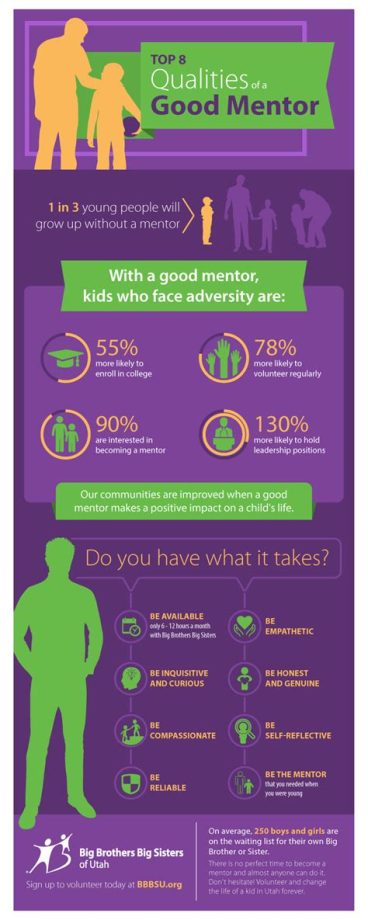Qualities Of A Good Mentor: Inspire And Guide Others

Becoming a mentor is a great responsibility. It requires patience, dedication, and a willingness to share your knowledge and experience. Whether you are mentoring someone in your field or in your personal life, there are certain qualities that can make you an effective mentor. In this article, we will explore the top qualities of a good mentor and how you can develop them.
1. Empathy and Listening Skills
Being able to empathize with your mentee is essential to building a strong relationship. You need to be able to listen to their concerns and understand their perspective. This means being attentive, patient, and non-judgmental. When your mentee feels heard and understood, they will be more open to your guidance and advice.
Tip: Use Active Listening Techniques
Active listening involves paying close attention, paraphrasing, and reflecting on what your mentee is saying. It shows that you are engaged and interested in their thoughts and feelings. Some techniques include:
- Maintaining eye contact
- Asking open-ended questions
- Repeating back what you heard to confirm understanding
- Avoiding interrupting or making assumptions
2. Knowledge and Experience
A mentor should be knowledgeable and experienced in their field or area of expertise. This allows them to provide valuable insights and advice to their mentee. When your mentee sees that you have achieved success in your own career or personal life, they will be more likely to trust and respect your guidance.
When sharing your knowledge and experience, be sure to relate it to your mentee’s situation. This will help them see how they can apply your advice to their own life. Use personal anecdotes and stories to illustrate your points. This will make your mentoring sessions more engaging and memorable.
3. Patience and Understanding
Mentoring can be a slow and gradual process. It requires patience and understanding on the part of the mentor. Your mentee may not always follow your advice or make progress as quickly as you would like. However, it is important to remain patient and supportive. Remember that everyone learns at their own pace.
Tip: Set Realistic Goals
Work with your mentee to set achievable goals and milestones. This will help them see their progress and stay motivated. Break down larger goals into smaller, more manageable steps. Celebrate their successes along the way.
4. Positive Attitude and Encouragement
A good mentor should have a positive attitude and provide encouragement to their mentee. This helps to build confidence and self-esteem. When your mentee feels supported and encouraged, they will be more likely to take risks and try new things.
Tip: Use Positive Reinforcement
When your mentee achieves a goal or makes progress, praise them for their effort and hard work. Use positive reinforcement to encourage them to continue on their path. Avoid criticism and negativity, which can be demotivating.
5. Flexibility and Adaptability
Mentoring is not a one-size-fits-all process. Each mentee is unique and may require a different approach. A good mentor should be flexible and adaptable, able to adjust their mentoring style to meet the needs of their mentee.
Tip: Be Open to Feedback
Ask your mentee for feedback on your mentoring style. This will help you understand their needs and preferences. Use this feedback to adjust your approach as needed.
6. Respect and Trust
A good mentor should respect their mentee’s opinions and ideas. They should also be trustworthy, able to keep confidential information private. When your mentee trusts and respects you, they will be more likely to seek your guidance and advice.
Tip: Be Honest and Transparent
When providing advice and feedback, be honest and transparent. However, be sure to do so in a way that is respectful and constructive. Avoid being overly critical or negative.
7. Time Management and Availability
Mentoring requires time and availability. A good mentor should be able to make time for their mentee and be available when needed. This requires good time management skills and a willingness to prioritize mentoring.
Tip: Set Clear Boundaries
Set clear boundaries with your mentee regarding your availability. Let them know when you are able to meet or talk. Avoid over-committing yourself or neglecting your other responsibilities.
8. Continuous Learning and Improvement
A good mentor should be committed to continuous learning and improvement. This means staying up-to-date on industry trends and best practices. It also means being open to feedback and willing to improve your own mentoring skills.
Tip: Attend Workshops and Conferences
Attend workshops and conferences related to your field or area of expertise. This will help you stay current on industry trends and best practices. It will also provide opportunities to network with other mentors and learn from their experiences.
Conclusion
Becoming a good mentor requires a combination of skills and qualities. By developing empathy, knowledge, patience, positivity, flexibility, respect, time management, and a commitment to continuous learning, you can inspire and guide others to achieve their goals. Remember that mentoring is a two-way process. Both you and your mentee can learn and grow from the experience.
FAQs
1. What is the role of a mentor?
A mentor is someone who provides guidance, advice, and support to another person. They use their knowledge and experience to help their mentee achieve their goals and reach their full potential.
2. What are the benefits of having a mentor?
Having a mentor can provide many benefits, including:
- Access to valuable knowledge and experience
- Increased confidence and self-esteem
- Networking opportunities
- Personal and professional growth
3. How do you find a mentor?
You can find a mentor through networking events, professional organizations, or online platforms. Look for someone who has experience and knowledge in your field or area of interest. Be sure to approach them respectfully and explain why you are interested in their guidance.

